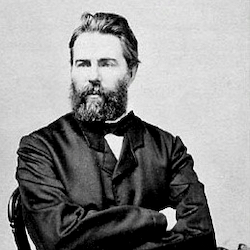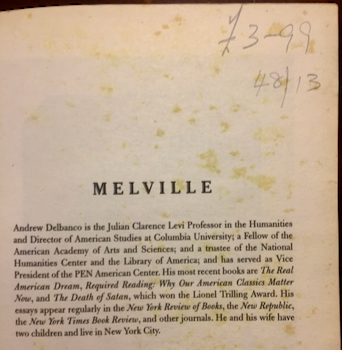A simple glance at the title of Andrew Delbanco’s Melville: His World & Work, should be enough to give even the least perceptive reader a clue about the subject being considered. Most everyone knows Melville as the author of Moby-Dick, a book so substantively impactful that even the most culturally illiterate of us know the words Ishmael, Ahab and White Whale. Still, for all its subsequent successes, Moby-Dick was, in Melville’s lifetime, a publishing failure: it earned Melville pennies and sold so poorly that it was out of print before his death.
What’s known biographically about Melville stands in inverted relation to the quantity of material written about him. Studies of such recondite characters can fall prey to two serious faults: first, in order for a biographer to study someone as elusive as Melville, there must be a deep and abiding passion for Melville’s writing. Obviously that’s great, but such a passion can all too easily blind a critic’s eyes and lead her to stumble down the path of sycophancy. Delbanco dances around this: it’s rare for him to be truly critical of even the most horrid of Melville’s writings, and typically the most he can muster is an acknowledgement of the paltry paucity of many of the poems (some of which are, frankly, bad). Second, due to the dearth of information available, such studies typically fall into unsupported, and frequently unsupportable, projections about the subject. While this may provide fodder for critical careers that are increasingly difficult to fund in our culture, it’s also quite unsatisfying to read. (He might have been thinking about this…, is a modal structure that, when repeated, frankly becomes annoying.)
It’s worth pausing briefly to take issue with the Times endorsement bannering the cover below: it’s a struggle of Ahabean proportions to call any biography whose final three chapters are titled, respectively, Adrift, Season of Death, and The Quiet End, “thrilling.” As these titles indicate this is a dismal tale. We’re dealing with a man who, after his early 30’s, wrote little of significance before his death at 72, a fact that did not go unnoticed in the minimal coverage his writings received in the press of his day. Melville spent the substantive portion of his latter life as a customers inspector in New York earning four dollars a day; he survived the death of two of his children, one from suicide in Melville’s own home; he ceased writing fiction and instead turned to poetry, much of which went unpublished, and of that which was published, much of it went unread; when he died, a common reaction was, I didn’t know he was even still alive…
I ordered my copy this past December from AwesomeBooksUSA, an online retailer located in Wilmington, Delaware, a state I’ve never visited. Because that part of the country is so convoluted, I had to look Delaware up on a map (it’s the jangly, Idaho-shaped sliver wedged between New Jersey, Philadelphia and Maryland). The copy I received is musty enough to make my nose tighten and recoil; if I flip its pages then rub my eyes I can feel the allergies begin their irritation. Potentially this says less about the book and more about my biology, for with each passing year my allergies become more easily aggravated. The pages are a mottled yellow, as if the book were aged to the point of having developed liver spots; or perhaps some intemperate artists had pointillistically imprinted the pages with a narrow neon yellow highlighter. [1]Curiously, Tom Nicholas’ recent book, VC: An American History, draws unique comparisons and connections between the American whaling industry of Melville’s time and modern American … Continue reading
Prior to my opening it, the book had only two scraps of markings inside (for better or worse it now has more, which will be explored below.) Each of them is equally baffling. The first page has an unidentifiable symbol in the upper right corner. Drawn in a sharply angled pencil, it resembles something between a vertical version of Pynchon’s post horn and Prince’s contractual evasion. Beneath it are the numbers 3-99, and below them are 48/13, all in pencil. I can make no sense of either the symbol or the numbers — it’s possible the 3-99 refers to the price, but the way it’s written is highly atypical (I paid $5.15 plus shipping); as the book was published in 2005, the 99 cannot refer to publication; the 48/13 are impossible dates in our calendaring system and remain a mystery.
More curiously, on page 108 the following occurs:
 In case you can’t read the text clearly, Delbanco’s sentence reads: “In 1847, when Melville had begun work on Mardi, calls for revolution (in France) were just beginning to be heard; by the time he finished it in the fall of 1848, reaction and restoration were at hand; and in December Louis Napoleon ascended to the throne once held by his uncle Bonaparte.” As you’ll see from the picture, some previous and sadly anonymous author (AA) took issue with that, and marked the passage with a chunky asterisk supplemented at the bottom of the page, which reads:
In case you can’t read the text clearly, Delbanco’s sentence reads: “In 1847, when Melville had begun work on Mardi, calls for revolution (in France) were just beginning to be heard; by the time he finished it in the fall of 1848, reaction and restoration were at hand; and in December Louis Napoleon ascended to the throne once held by his uncle Bonaparte.” As you’ll see from the picture, some previous and sadly anonymous author (AA) took issue with that, and marked the passage with a chunky asterisk supplemented at the bottom of the page, which reads:
“no, he was elected President in Dec. 1849, staged a coup d’etat in Dec. 1851, and was proclaimed emperor 1 year later.”
The historical record itself isn’t especially relevant, except to note that Louis Napoleon was, as Delbanco wrote, elected in December 1848, not 1849 as AA indicates (the rest of AA’s note is accurate). Of course this discrepancy only makes AA that much more intriguing, for here we have enough of a punctilious history buff to feel that a correction was in order, yet the amendment subsequently provided is inaccurate.
I find myself wondering: To whom was AA directing this note? I can only imagine the gnawing concern AA might have felt, for what would happen if a subsequent, historically naive reader such as myself came across this passage and grossly misconceived the context in which Melville was writing? One shudders to imagine the outcome.
**********
Since this section is devoted to scraps and scribbles, here are a couple marks I made while reading (as with most of my physical media, this book will be made publicly available to the highest bidder upon my death, or immediately, depending upon the bid offered):
Melville, after reading the positive reviews of his second novel, Redburn, wrote the following in his journal: “I, the author, know (it) to be trash, & wrote it to buy some tobacco with.” (pg. 111)
[Would that my own work provided me with such disposable income…]
♠
Writing to a female reader about Moby-Dick: “Don’t you buy it—don’t you read it, when it does come out, because it is by no means the sort of book for you. It is not a piece of fine feminine Spitalfields silk—but is of the horrible texture of a fabric that should be woven of ships’ cables & haulers. A Polar wind blows through it, & birds of prey hover over it.” (pg. 124, italics mine)
“I have written a wicked book, and feel spotless as the lamb. Ineffable socialites are in me.” (from a letter to Nathanial Hawthorne re: Moby-Dick) (pg. 176)
♥
“Total earnings from the American sales of Moby-Dick would ultimately come to $556.37, considerably less than Melville had realized from any previous book.” (pg. 178)
♦
The following reminded me of my own brief time working aboard boats, where we would playfully banter the aphorism that: It ain’t gay if you’re underway. It also made me think of my friend Jim, who came out to his very unsuspecting mother by rhetorically asking, “Mom, how could not know that I’m gay? Why else did you think I joined the Navy and became a secretary on a submarine, where I was locked inside a confined space with hundreds of men??” (poor Mom)
“As far as we know, Melville never submitted to a phrenological examination, but it would be prudish to doubt that during his nearly four years at sea he had found himself aroused in the company of other men. In the maritime world of his youth, the pairing up of older with younger men in a relation known as ‘chickenship’ was evidently common. When one young sailor, Philip Van Buskirk, asked a veteran seaman in 1853, ‘Well White, what’s your opinion on those men who have to do with boys? If you were King, wouldn’t you kill every one of ’em?’ he got a nuanced answer:
White: ‘Yes, Every feller that lives ashore and does that, I’d shoot Him—yaas, by—, I’d shoot him’
Van Buskirk: ‘And if you had a navy, wouldn’t you kill every man in it found guilty of that?’
White: ‘No;—what can a feller do?—three years at sea—and hardly any chance to have a woman. I tell you… a feller must do so. Biles and pimples and corruption will come out all over his body if he don’t.'” (pg. 200-01)
References
| ↑1 | Curiously, Tom Nicholas’ recent book, VC: An American History, draws unique comparisons and connections between the American whaling industry of Melville’s time and modern American Venture Capitalism. I recently checked this book out of the library: at present it has no markings (and I’m not enough of a monster to adulterate such a virtue), and smells pure as only new books can, inky clean and dry. |
|---|


